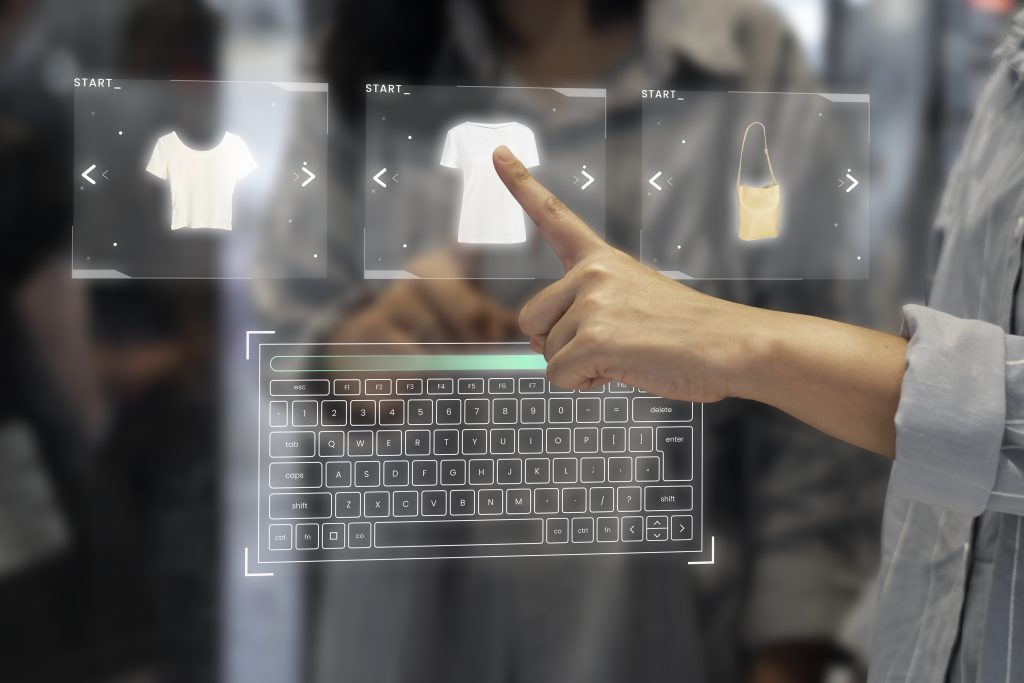Are you skeptical about how the retail industry has managed to tackle the challenges of digital disruption? Well, let us assure you that retailers have not only adapted but thrived in this ever-changing landscape. In this article, we will delve into the strategies and tactics employed by the retail industry to navigate the waves of digital disruption. From embracing e-commerce platforms and mobile commerce to leveraging data analytics and AI, retailers have transformed their operations to stay competitive. They have optimized supply chain management, enhanced the customer experience, and even experimented with emerging technologies like blockchain. So, join us as we explore how the retail industry has successfully dealt with digital disruption and emerged stronger than ever before.
Adoption of E-commerce Platforms
You should consider adopting e-commerce platforms to stay competitive in the digital retail landscape. The rise of digital disruption has greatly influenced consumer behavior and demands, making online shopping a dominant trend in the retail industry. By embracing e-commerce platforms, you can tap into the vast potential of digital marketing strategies to engage with customers effectively. Online shopping trends indicate a growing preference for the convenience and accessibility of digital platforms, and by being present in this space, you can reach a wider customer base.
Furthermore, e-commerce platforms offer digital payment solutions that cater to the evolving needs of consumers. With the increasing popularity of mobile payments and digital wallets, it is essential to provide secure and seamless transactions to build trust and loyalty among customers. Implementing cybersecurity measures to protect customer data is also crucial in today’s digital landscape.
Incorporating e-commerce platforms into your retail strategy allows you to enhance customer engagement by personalizing the shopping experience. Utilizing data-driven insights, you can provide tailored recommendations and offers that resonate with individual customers, increasing their satisfaction and loyalty.
Integration of Mobile Commerce
One crucial step in dealing with digital disruption in the retail industry is to incorporate mobile commerce into your business strategy. The integration of mobile payments, mobile app development, and mobile marketing strategies are essential in staying competitive in today’s digital landscape. Mobile commerce trends show that consumers are increasingly using their smartphones to make purchases and engage with brands. By embracing mobile commerce, you can enhance customer engagement and provide a seamless shopping experience.
Mobile app development plays a significant role in mobile commerce. Developing a user-friendly and feature-rich mobile app allows you to connect with customers directly and provide personalized recommendations. It also enables you to leverage push notifications and location-based services to engage with customers in real-time.
Implementing mobile marketing strategies is another crucial aspect of mobile commerce integration. By leveraging mobile advertising, social media platforms, and SMS marketing, you can reach a wider audience and promote your products or services effectively. Mobile marketing also allows you to gather valuable customer data and insights, which can inform your future marketing campaigns.
Implementation of Omnichannel Retailing
Implementing an omnichannel retailing strategy can revolutionize your business and drive exponential growth in the digital age. As digital transformation continues to reshape the retail industry, adopting a customer-centric approach and enabling seamless integration across multiple channels has become essential. Omnichannel integration allows retailers to provide personalized experiences to their customers, ensuring a consistent and cohesive journey across various touchpoints.
By embracing omnichannel retailing, you can create a unified shopping experience for your customers, regardless of whether they choose to shop online, in-store, or through mobile devices. This integration enables you to understand your customers’ preferences and behaviors, allowing you to tailor your offerings and recommendations to their individual needs.
Furthermore, implementing an omnichannel strategy can improve customer loyalty and satisfaction. According to a study by IDC, omnichannel customers have a 30% higher lifetime value compared to those who shop through a single channel. By providing a seamless experience, you can increase customer engagement and retention.
In addition, omnichannel retailing allows you to optimize your operations and inventory management. With real-time data and analytics, you can make data-driven decisions to streamline your supply chain, reduce costs, and improve efficiency.
Utilization of Data and AI
By leveraging data and AI, retailers have been able to effectively navigate the challenges posed by digital disruption in the retail industry. AI-driven personalization has allowed retailers to deliver tailored experiences to customers, increasing customer satisfaction and loyalty. Data-driven decision making has enabled retailers to make informed choices, optimizing operations and improving efficiency. Mobile app development has revolutionized the way retailers engage with customers, providing a seamless shopping experience across channels. IoT in retail has facilitated real-time data collection and analysis, helping retailers gain valuable insights into customer behavior and preferences. Automation in core operations has streamlined processes, reducing costs and improving productivity.
To illustrate the impact of data and AI in retail, consider the following table:
| Benefits of Data and AI in Retail |
|---|
| AI-driven personalization |
| Data-driven decision making |
| Mobile app development |
| IoT in retail |
| Automation in core operations |
Through AI-driven personalization, retailers can offer personalized product recommendations and targeted marketing campaigns, leading to increased sales and customer satisfaction. Data-driven decision making allows retailers to analyze customer data and make informed decisions about inventory management, pricing, and marketing strategies. Mobile app development enables retailers to provide a seamless shopping experience, allowing customers to browse and purchase products on their smartphones. The use of IoT in retail allows retailers to collect real-time data from connected devices, enabling them to understand customer behavior and optimize operations. Automation in core operations helps retailers streamline processes, reducing costs and improving efficiency.
Automation of Retail Operations
Streamline your retail operations by automating key processes and improving efficiency. Here are three ways automation can revolutionize your retail operations:
- Automation in inventory: By integrating IoT devices, you can automate inventory management processes, such as real-time tracking, replenishment, and demand forecasting. This ensures accurate inventory levels, reduces stockouts, and optimizes supply chain efficiency.
- Personalization through AI: Leverage the power of artificial intelligence to personalize customer experiences. AI-driven algorithms analyze customer data to provide tailored recommendations, personalized marketing messages, and targeted promotions. This enhances customer engagement, improves conversion rates, and boosts customer loyalty.
- Impact on workforce: Automation can redefine the roles and responsibilities of your workforce. While some tasks may be automated, employees can focus on more strategic and creative aspects of their jobs. This can lead to increased job satisfaction and productivity. It is essential to provide training and upskilling opportunities to adapt to the changing demands of the industry.
Incorporation of Augmented Reality
To stay ahead in the digital age, retailers have embraced augmented reality (AR) in their operations. Augmented reality applications have revolutionized the retail industry by providing immersive experiences for customers. AR in retail stores allows shoppers to visualize products in a virtual environment, helping them make informed purchasing decisions. By using AR in product visualization, retailers can showcase products in a more engaging and interactive way, enhancing the overall shopping experience. Additionally, AR in customer engagement enables retailers to connect with consumers on a deeper level, offering personalized recommendations and tailored services. Virtual reality experiences have also been incorporated into retail, allowing customers to virtually explore products and try them out before making a purchase. The integration of augmented reality has proven to be a game-changer for retailers, enhancing customer satisfaction, driving sales, and differentiating themselves from competitors. As the retail industry continues to evolve, retailers must continue to explore and leverage the potential of augmented reality to stay relevant and meet the ever-changing demands of digital-savvy consumers.
Enhancement of Customer Experience
Immersive technologies like augmented reality have transformed the retail industry, enhancing the customer experience in unprecedented ways. These innovative technologies are revolutionizing the shopping experience by improving personalization, enhancing engagement, and advancing customer centricity.
- Improving personalization: With the implementation of augmented reality, retailers can now offer personalized recommendations and tailored services to their customers. By analyzing customer data and preferences, retailers can create personalized shopping experiences that cater to individual needs and preferences. This not only enhances customer satisfaction but also drives repeat business and brand loyalty.
- Enhancing engagement: Augmented reality allows customers to interact with products in a virtual environment, creating a highly engaging and interactive shopping experience. Customers can visualize how products will look in their own space, try on virtual clothes, or even test out virtual furniture arrangements. This level of engagement not only makes the shopping process more enjoyable but also increases the likelihood of making a purchase.
- Implementing innovative technologies: The integration of augmented reality into the retail industry has paved the way for the implementation of other innovative technologies. From virtual reality to artificial intelligence, retailers are constantly finding new ways to enhance the customer experience and stay ahead of the competition.
Utilization of Blockchain Technology
With the inclusion of blockchain technology in the retail industry, you can expect to see enhanced visibility and transparency in transactions and payment records. Blockchain applications offer numerous benefits for retailers, including improved security and fraud prevention. By utilizing blockchain technology, retailers can ensure that their payment integration systems are secure and protected from unauthorized access. This technology also allows for seamless supply chain tracking, enabling retailers to track products from the source to the point of sale, enhancing efficiency and reducing the risk of counterfeit products. Additionally, blockchain technology provides transparency benefits by creating a decentralized and immutable ledger of all transactions, making it easier to verify the authenticity and validity of transactions. This not only benefits retailers but also instills confidence in customers, as they can trust that their transactions are secure and accurate. In summary, the utilization of blockchain technology in the retail industry offers significant advantages, including increased transparency, improved payment integration, enhanced supply chain tracking, and better fraud prevention measures.
Optimization of Supply Chain Management
One crucial aspect of dealing with digital disruption in the retail industry is optimizing supply chain management. In order to stay competitive in the rapidly evolving digital landscape, retailers need to streamline logistics, enhance inventory management, improve procurement processes, optimize vendor management, and enhance financial management.
- Streamlining logistics: With the help of digital technologies, retailers can improve the efficiency of their supply chain by automating processes, reducing lead times, and increasing visibility. This allows for faster and more accurate delivery of products to customers.
- Enhancing inventory management: Digital disruption enables retailers to have real-time visibility into their inventory, helping them optimize stock levels, reduce stockouts, and improve demand forecasting. This leads to better inventory turnover and increased customer satisfaction.
- Improving procurement processes: By leveraging data analytics and AI technologies, retailers can make more informed procurement decisions, negotiate better deals with suppliers, and ensure timely delivery of goods. This helps in reducing costs and improving overall supply chain efficiency.
Incorporating these strategies for optimizing supply chain management can help retailers adapt to the changing market dynamics and customer expectations brought about by digital disruption. It allows them to stay competitive, improve operational efficiency, and deliver a seamless customer experience.
Embracing Emerging Technologies
To effectively navigate the challenges presented by digital disruption in the retail industry, you must embrace emerging technologies. These technological advancements are driving digital transformation and can provide a competitive advantage by improving operational efficiency and adopting a customer-centric approach. By leveraging emerging technologies, retailers can optimize their supply chain management, enhance inventory management, and personalize customer experiences.
Embracing emerging technologies in the retail industry is essential for staying competitive in the rapidly evolving digital landscape. Let’s take a look at some of the transformative effects of these technologies:
| Technological Advancements | Impact on Retail Strategies |
|---|---|
| Artificial Intelligence | Enables retailers to automate core operations and enhance data analytics capabilities. |
| Machine Learning | Enhances customer segmentation and allows for tailored messaging and offerings. |
| Blockchain | Improves transparency and security in transactions and payment records. |
| Augmented Reality/Virtual Reality | Enhances the customer experience by bridging the gap between pre-purchase and in-store experience. |



